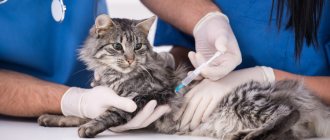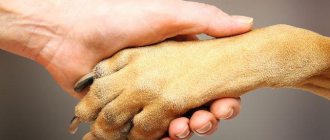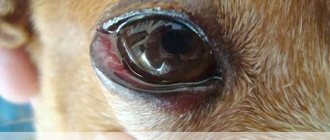The health and impeccable appearance of your beloved pet largely depends on the state of its immune system. An animal's immunity consists of cellular and humoral factors. The complex structure of the body's defenses is designed to protect the pet from pathogenic viruses, bacteria, pathogenic fungi and other microorganisms.
Immune function depends on many external and internal factors. If the body's defenses are weakened, the owner must come to the aid of his furry friend.
Causes of decreased immunity
Veterinarians and experienced dog breeders note the following reasons leading to decreased immunity in four-legged pets.
| Causes of decreased immunity in dogs | |
| Unbalanced diet | An inadequate diet, poor in protein components and vital amino acids, leads to a decrease in the production of immunoglobulins in the body of dogs. Deficiency of vitamins A, group B, ascorbic acid, vitamin D, and nicotinic acid in food products causes a decrease in the activity of cellular protective factors. A lack of minerals in the diet - calcium, magnesium, selenium, copper, iron - leads to a disruption in the production of antibodies. |
| Physical inactivity or excessive exercise | Lack of exercise, short walks in the fresh air, and little physical activity of the animal leads to oxygen starvation in the tissues, which is accompanied by low production of cellular protective factors. Physical overload provokes fatigue in the dog, which results in a malfunction of the immune system. |
| Helminth infections have a significant impact on the pet’s immunity. Parasites not only consume nutrients supplied with food, but also poison the dog’s body with toxic waste products. Helminthic infestations lead to the fact that the humoral mechanisms of immunity respond to the introduction of the vaccine with a weak production of the necessary antibodies. In this regard, veterinary experts strongly recommend that owners deworm their dogs before the next preventive vaccination. | |
| Infecting a pet with fleas and lice-eaters undermines the protective functions of the skin, opening the way for pathogens. The dog's immune system is especially affected by demodicosis and otodectosis. | |
| Having thrown all its efforts into the fight against pathogenic viruses and bacteria, the pet’s body has few effective mechanisms to combat fungi, rickettsia and other pathogenic agents. | |
| Exacerbation of chronic diseases of internal organs | Gastritis, hepatitis, colitis, diseases of the urinary system lead to a weakening of the defenses of the four-legged friend’s body. |
| Long-term use of antibacterial agents and glucocorticoids | Accompanied by a violation of cellular immunity due to the development of dysbacteriosis and destructive processes in the liver. |
| The physiological state of the female is associated with a high consumption of nutrients and stress for the body, which cannot but affect the state of the immune system. | |
| Trauma, surgery | The pet’s defenses, aimed at the processes of regeneration of damaged tissues, cannot cope with pathogenic microorganisms from the outside. |
| Unsatisfactory conditions of detention | Smoky rooms, humidity, dampness, and cold in places where dogs are kept contribute to the suppression of the body's immune system. |
In veterinary medicine, much attention is paid to the influence of stress factors on the pet’s immunity. Moving, a change of owner, the appearance of a new family member or pet, or cruel treatment by humans is difficult for many dogs and is accompanied by a decrease in the body’s defenses against infectious agents.
None And here is more information about the treatment of rhinitis in dogs.
[custom_ads_shortcode1]
Nonspecific immunity factors.
They are numerous and act interconnectedly in the entire system of the body. Under natural conditions, infection of the body is prevented by the following groups of protective devices:
1. Skin and mucous barriers. Intact skin and mucous membranes are impenetrable to most microorganisms. The skin and mucous membranes are not only a mechanical barrier, but also a sterilizing barrier against many microbes. The bactericidal properties of the skin are due to lactic and fatty acids contained in the secretions of the sweat and sebaceous glands. The secretion of the glands of the mucous membranes, contained in saliva, tears, nasal secretions, and milk (lyzyme-protein substance such as an enzyme, dissolves bacteria, mainly from the cocci group), has an antimicrobial effect. The secretions of the glands of the digestive tract have a bactericidal effect on bacteria. Saliva and gastric juice, as well as bile, which has the ability to neutralize a number of viruses, are highly bactericidal.
2. Lymphatic barriers. Those microbes that managed to pass through the skin and mucous membranes encounter a new barrier - the lymph nodes (when microbes enter through the pharynx, the peripharyngeal lymphatic ring becomes a barrier). Once in the lymph nodes, the microbes are captured by the cells of the reticuloendothelial system and undergo phagocytosis. The barrier function of lymph nodes increases after vaccination.
3. Phagocytosis and inflammation. The fight against microbes that have entered the body, at the site of which the body responds with inflammation, is carried out by leukocytes (macrophages), which absorb microbial cells and destroy them with their enzymes.
4. Humoral factors. Once in the blood, microbes encounter a number of defense mechanisms. Blood and its serum have bactericidal and bacteriostatic activity against many microbes (anthrax, swine erysipelas, staphylococci) due to the bacteriolysin present in it. Humoral factors also include complement, properdin, thermostable β-lysine, lysozyme and leukins.
All phenomena of immunity are regulated by the neurohumoral pathway . In this case, hormones that reduce the reactivity of connective tissue - anti-inflammatory and inflammatory hormones that increase its reactivity - are of particular importance. Anti -inflammatory hormones include adrenocorticotropic hormone and cortisone , and inflammatory hormones include somatotropic hormone and deoxycorticosterone-type hormone. Anti-inflammatory hormones inhibit the production of antibodies, while inflammatory hormones increase it.
Signs in dogs
Symptoms of low immunity in animals are not as easy to recognize as it seems at first glance. Signs of immunodeficiency are general and do not always appear in a pronounced form. In addition, similar symptoms are observed in dogs with a deficiency of amino acids, vitamins and minerals in the body.
Veterinarians recommend that owners of four-legged pets pay attention to the following clinical manifestations:
- Dull, dry, disheveled coat without shine. The skin is dry, inelastic, with signs of dehydration.
- The animal avoids active games and is sedentary. Sometimes a sluggish, apathetic state is observed. The dog avoids communication with humans and seeks solitude.
- Often the dog shows unmotivated aggression towards the owner and household members.
- Colds are becoming more frequent, regardless of the season and weather. Conjunctivitis, rhinitis, bronchitis, and cystitis most often indicate a decrease in the pet’s body’s defenses.
- Joint diseases and stiffness of movement may also indicate problems with the dog’s immunity.
- Poor appetite, perversion of taste. The animal can eat inedible objects, lick polyethylene and plastic.
Often, the owner observes similar symptoms in a dog after suffering from an infectious or severe non-contagious disease, surgery, pregnancy, childbirth and feeding puppies in females. If signs of immunodeficiency are detected, the furry pet should be shown to a veterinarian, who will rule out diseases and confirm the owner’s fears.
[custom_ads_shortcode2]
How to boost your dog's immunity
If all vaccinations have been completed, you can take additional measures to strengthen and increase the animal’s immunity.
- Always protect your pet from parasites. A special anti-bloodsucking remedy should be applied to the withers once a month. Give your dog a deworming tablet every 3-4 months.
- Proper nutrition is the basis of a strong immune system. Whatever you feed your dog - homemade food or dry food, its diet should be diluted with vegetables and fruits, whole grain cereals. Be sure to offer your dog dairy products – kefir, milk, cottage cheese – a couple of times a week. Don't forget about boiled meat. It is not recommended to feed raw meat, as this can cause the appearance of worms. There must be a routine and discipline when eating.
- If you notice problems with your dog's stool (diarrhea or constipation), you should definitely give your pet probiotics. They will improve the condition of the intestinal microflora and strengthen the immune system.
- If the dog has obvious disorders in the immune system, you can resort to immunomodulators. Among them are Echinacea tincture, Cycloferon, Ribotan, Maxidin, Gamavit, Immufonal. Before using medications, be sure to consult with your veterinarian about the possibility of taking these medications.
- To prevent your dog from getting sick, it is very important to provide him with peace of mind. Often dogs experience stress from constant trips to the veterinarian, moving, and visiting exhibitions. Perhaps you should give up going out for a while.
- The dog needs to be hardened. To do this, spend more time with her in the fresh air, if possible, visit bodies of water, run and play. Try to walk your dog at any time of the year - in hot or cold weather, without limiting yourself to five minutes to satisfy its natural needs.
- You can strengthen your immune system during the cold and rainy season with the help of a vitamin complex. When purchasing, please note that it must contain the following vitamins - A, B5, C, D, F, PP. The complex should also contain minerals that are most necessary for a dog - zinc, iron, calcium, manganese, selenium, magnesium, iodine.
- Twice a year you can drink a course of Altai mumiyo. This is an excellent remedy that helps restore strength and strengthens the immune system. The course is 20 days, during which you need to give the dog one mummy tablet per 5 kg of weight every day.
These simple rules will help you keep your dog healthy. The most important thing in ensuring strong immunity for a dog is your love, care and affection. After all, when the owner is nearby, the dog does not experience psychological discomfort, it is calm and balanced. Love your dog, take care of it, look after its health, and it will respond to you with canine devotion and boundless love.
how to remove ticks from a dog at home
General recommendations on how to boost an animal’s immunity
The owner can strengthen the dog’s body’s defenses by following the following recommendations from veterinary specialists:
- A complete diet, quality feeding. When using ready-made feed mixtures, preference should be given only to high-quality premium and super-premium food. Specialized mixtures are enriched with vitamins and minerals and contain complete proteins necessary for the body. Such food is developed taking into account the physiological needs of dogs of certain breeds, age, and weight.
With a natural type of nutrition, the owner must pay attention to balancing the diet with protein. The main components in the dog's menu should be lean beef, chicken, turkey, and lean fish. Cottage cheese is a source of protein and minerals. Fermented milk products will help support the intestinal immune system.
Vegetables (carrots, pumpkin, broccoli, turnips, etc.) are a source of vitamins and fiber necessary for the body. A veterinarian will help you create a complete diet for your dog.
- Control of external parasites . In order to prevent infection with ectoparasites, the animal should purchase a special anti-parasitic collar or use special drops on the withers. The owner must comply with processing times and carry out the next procedure on time.
- Deworming an animal once every 3 months will prevent infection with worms. For processing, high-quality broad-spectrum preparations should be used.
- The use of probiotic agents after a course of antibacterial therapy will return the cellular defense of the intestine to normal. For this purpose, veterinarians advise the use of drugs such as Bioprotectin, Bifitrilak, Lactobifadol, Zoonorm, etc.
- Fighting physical inactivity. Active games with your pet, training, and various exercises help keep the dog in good physical shape. Walks in the fresh air should last at least 2 hours a day.
- Hardening. Gradually accustoming your pet to long walks and swimming in open water has a beneficial effect on strengthening the dog’s immune system.
- Maintaining hygiene rules. Regular grooming (combing, washing), hygiene of the dog’s eyes, nasal and oral cavity is the key to strengthening the body’s local defenses.
- Optimization of conditions of detention . The dog should be provided with a spacious, bright, warm room without drafts. It is prohibited to smoke in the presence of an animal, spray insecticides and household aerosol products.
An important condition for maintaining immunity at a high level is the fight against stress. An affectionate and friendly attitude towards your pet, a friendly and calm atmosphere in the house, and the absence of negative emotions help strengthen the animal’s immune defense mechanisms.
[custom_ads_shortcode3]
Dog immunity
In the prevention of any disease, maintaining immunity at a high level is extremely important. Let us list the main factors affecting immunity. This is the physical well-being of the animal, its mental and physiological state and breed. Physical well-being refers to the comfort of the conditions, which determines the physical form of the dog: a dog sitting on a chain in a dirty puddle and receiving bare-bones oatmeal is much more likely to get sick than its fellow tribesman who sleeps on dry straw, walks daily in the wild and eats a varied diet .
The mental state of the animal is no less important. Often, mental discomfort can undermine the immune system in a way that the most terrible conditions of detention cannot. It is no coincidence that many animals fell ill after participating in exhibitions or after unsuccessful matings. When kept in constant conditions, when nothing new happens, the nervous system does not receive sufficient training. Boredom itself leads to serious ill-being. When dogs from such an “impoverished environment” are bombarded with an avalanche of fresh information that they cannot cope with, the disease becomes even more severe.
Social factors, such as constant clashes with the owner, can also have a negative impact on health. Uncertain, constantly changing relationships also have a negative impact: at first the dog is allowed whatever he wants, and literally an hour later, using force, they begin to find out who is boss in the house.
If there are several dogs, one of them may become a “whipping boy”. Such a social role is fraught with powerful nervous overstrain and naturally leads to impaired immunity.
A change in physiological state, for example the change of teeth or the onset of the first heat in females, or, oddly enough, the first adult molt in males, can significantly weaken the immune system.
The last factor influencing immunity is breed.
As a rule, factory breeds that have lived for dozens of generations in large cities with a significant density of “canine population” are characterized by a fairly high immunity to epidemic diseases. Breeds of folk selection, being very resistant to pathogens of wound infections and to pathogens of local (endemic) diseases, are often highly sensitive to classic epidemic infections. Unfortunately, no dog is an exception to this rule.
It is especially important to ensure a high immune status in puppies. They do not have their own immunity, and they can only obtain passive immunity from their mother’s milk. At the very beginning of life, the tension of the baby’s immunity is quite high, but by the month a breakthrough becomes possible. That is why it is necessary to pay a lot of attention to the well-being of the nursing bitch and suckling puppies.
The composition of the intestinal microflora largely provides resistance to disease. With normal microflora in the intestine, pathogenic microorganisms cannot rapidly multiply; in addition, it indirectly promotes the proliferation of blood cells responsible for immune defense.
The owner must maintain normal intestinal microflora in puppies.
It is useful to know the names of the main representatives of normal flora: lactobacilli, bifidobacteria, colibacteria, acidophilus fungus and some others. Bacterial preparations intended for oral use are now widely available in pharmacies. The most complete set of microflora components is contained in such a fermented milk product as matsoni; its composition in yogurt is somewhat poorer. We recommend seeding the intestines of newborn puppies with yogurt; if it is not available, use pure pharmaceutical preparations, although with such a replacement, most likely, some component will be missing. And yet, it is better to seed the intestines with at least one component of the microflora than to allow the penetration of pathogenic microorganisms (the same staphylococci and streptococci) from the environment, which will firmly settle in the intestines of the newborn if there are not enough bacteria of normal flora there, and with mother’s milk he can not getting enough immune factors.
Intestinal seeding should be repeated regularly.
It should be remembered that in both puppies and adult dogs, under severe nervous stress, the intestinal environment changes and the normal flora is disrupted. Inoculation with bacterial preparations is useful both in case of threat of disease and after exhibition or mating. When treating with antibiotics, do not forget to inoculate the intestines with normal flora, while simultaneously giving the antifungal drug nystatin.
One of the most important factors contributing to the disease is infection of the dog with worms. They are very diverse, can affect different organs, have a greater or lesser danger to life, but they all absorb nutrients and release toxins that reduce the vitality of the host organism.
With weak helminthic infestations, their effect on the dog under normal living conditions is practically unnoticeable. But as soon as living conditions or mental state deteriorate a little, the body’s vulnerability to toxins increases sharply. Very often, vaccination of a wormed dog leads to dire consequences, and the owner blames the “bad” vaccine for everything. With a high infestation of helminths, depending on the type of parasite, the dog may die either from poisoning with toxins, or from intestinal blockage, damage to the pulmonary alveoli, injuries to blood vessels and bile ducts, etc.
Deworming before mating is a mandatory measure for the bitch. We have already talked about worming puppies. A week before vaccination, anthelmintic is given. In adult dogs, in the absence of special indications, worms are expelled twice: in early spring before vaccinations and in early winter, when snow falls.
If you use medical drugs rather than veterinary ones, a number of them must be used according to a different scheme. So, decaris in the dose indicated in the leaflet is used for three days in a row.
Owners who brought their pets from Central Asia should be especially careful. Both adult dogs and, especially, puppies are completely infected with a wide variety of helminths, many of which are unknown even to parasitologists, many of which can be dangerous to humans.
Share our methods of increasing a dog’s immunity???
Material taken: V.I. Krukover “Special dog training”
PSVideo about dog vaccination
Tweet
Vitamins in injections and tablets, preparations
Special medications will help effectively cope with immunodeficiency in dogs. Veterinary medicine has a wide arsenal of immunomodulators.
Modern medications activate metabolic processes in the body, increase the bactericidal properties of blood serum, and accelerate the synthesis of immunoglobulins. Immunomodulators have a detoxifying effect, increase the body's resistance to stress and physical activity, and help adapt to unfavorable environmental conditions.
The following immunostimulants are widely used in veterinary practice: Gamavit, Roncoleukin, Maksidin, Glykopin, Immunofor, Immunofan, Ribotan. Most immunomodulators are used intramuscularly or subcutaneously. The course of treatment is from 5 to 10 days. The dosage is prescribed by a veterinarian and depends on the weight of the pet.
The choice of a particular drug should be entrusted to a qualified specialist. For example, Maxidin is effective as an immunostimulant for infectious diseases, and Gamavit will be useful in cases of decreased defenses due to vitamin deficiencies, difficult childbirth, etc.
In addition to immunomodulating drugs, you can increase the body's defenses with the help of vitamins. Veterinary specialists most often recommend injections of ascorbic acid, riboflavin, and cyanocobalamin. The use of vitamin preparations in the form of tablets is also effective, for example, Excel Multi Vitamin Senior 8 in 1, Beaphar, Kanvit Junior, etc.
Vitamin-mineral complexes to strengthen the immune system should contain vitamins A, D, ascorbic and nicotinic acid, vitamin B5, as well as zinc, selenium, iodine and iron. Watch this video about vitamins for dogs to strengthen the immune system:
[custom_ads_shortcode1]
Folk remedies for a weakened animal
In addition to traditional medications and biological supplements, folk remedies can help the defenses of a weakened pet. For this purpose, freshly squeezed vegetable juices (carrot, cabbage, celery juice), as well as medicinal herbs, are used. Aloe, echinacea, ginseng, and St. John's wort have immunostimulating properties.
Infusions or decoctions of herbal raw materials should be used only after consultation with a veterinarian, since many folk remedies can cause allergies in your pet. The same rule applies to beekeeping products - propolis.
We recommend reading about colds in dogs. You will learn about the symptoms of a cold in a pet, medication and traditional methods of treatment, and preventive measures.
And here is more information about the treatment of pneumonia in dogs.
The immune system of the animal body is a complex structure. Its effective operation depends on nutrition, living conditions, and the presence of infectious and parasitic diseases. Having discovered symptoms of immunodeficiency in a pet, the owner should seek advice from a veterinarian.
A balanced diet and walks in the fresh air will help strengthen the defenses of your four-legged friend. An effective way to increase immunity are specialized drugs that have an immunomodulatory effect, as well as vitamin and mineral supplements.
[custom_ads_shortcode2]
Folk remedies to boost immunity
Folk remedies will help you recover faster after an illness. They can be combined with traditional biological additives and medications. These can be medicinal herbs, freshly squeezed vegetable juices. Decoctions and infusions of plant origin will be useful for lifting. But first you need to make sure that the dog does not have allergic reactions to them.
- Fish fat. To strengthen it, it is important to include fish oil in your diet, which contains essential fatty acids and Omega-3. The dog's coat immediately becomes healthier and the functioning of the immune system improves. Fish oil should be given in doses; too much will also be harmful.
- Vitamin E. Vitamin E plays a role in the functioning of the immune and cardiac systems, and also improves vision and muscle function. You should not overdose, everything is good in moderation.
- Rosemary. This plant is rich in calcium (necessary for bones and teeth), vitamin B6. It is added to food when the dog has a weak immune system after an illness.
If all owners followed the simplest rules of care and feeding, then dogs would get sick less. The most important thing in ensuring good health is to sincerely care for your pet. If he feels cared for, behaves calmly and balanced, and does not experience discomfort. An animal must be loved and protected, and then it will respond with devotion.
Currently reading:
- Games to choose for training a dog
- Recovery and nutrition of a dog after sterilization
- How to create the right diet for Shar Pei
- The American Cocker Spaniel is an adroit hunter and loyal friend.
Useful video
Watch this video about vitamins for dogs:
Immunity is a natural mechanism whose task is to protect the body from viruses. If it weakens, the dog becomes susceptible to a variety of diseases, often catching colds. She looks lethargic, inactive, and may have digestive problems.
This means that it is necessary to boost her immunity. Let's figure out how you can boost your dog's immunity?
The most common method today is vaccination. It helps the body develop immunity to certain pathogens. To do this, you need to get vaccinated regularly. A dog's diet also regulates immunity.
It must be balanced in terms of the amount of essential substances, vitamins and microelements.
The dog's diet should contain animal and vegetable proteins, fats, and carbohydrates. If the animal eats natural food, then it is important for the owner to ensure that the pet’s menu always includes:
- meat,
- various fresh vegetables,
- porridge,
- kefir,
- cottage cheese.
When feeding dry food, you should choose the highest quality premium or super premium product possible, which contains all the necessary substances. Immunity is especially weakened during pregnancy, so for such a bitch you should take care of special nutrition with certain supplements.
Good intestinal function also indicates high immunity and therefore the dog should be given probiotics regularly. If your dog eats a natural diet, it may lack vitamins, especially in winter.
[custom_ads_shortcode3]
Vaccination
Immunity can be congenital or acquired. Innate immunity is established at birth, but acquired immunity is something else. If a dog gets sick with a certain disease, its body will develop antibodies to the virus, which in later life will protect the animal from re-infection. Vaccination is a tiny fraction of an infected substance that is introduced into the animal’s body to produce antibodies.
A competent and timely approach to vaccination allows you to contain the epidemic of viral diseases, as well as save the life of your pet, sometimes from fatal diseases. 90% of vaccinated dogs do not get sick from the diseases they were vaccinated against. The remaining 10% experience a mild form of the disease.
In our country, vaccinations against distemper, rabies, viral enteritis, infectious hepatitis, parainfluenza and adenovirus are considered mandatory for dogs. All vaccinations are given according to schedule. The first vaccination occurs when the dog is two months old. After this, revaccination is done three weeks later. Adult dogs are injected once a year to maintain the amount of antibodies in the body. Rabies vaccination is given only once.
Do not vaccinate pregnant or just given birth bitches, as their body is weakened. After vaccination, you need to observe quarantine for several days - do not overcool your pet, walk only in clean places, and do not communicate with other dogs.
The most popular vitamins and preparations for increasing the immunity of dogs
Your pet can be given remedies to strengthen the immune system, such as.
- Immunal (echinacea),
- Ribotan,
- Cycloferon,
- Gamavit,
- Maksidin,
- Immunofan,
strictly following the instructions and calculations based on the weight of the animal. However, it should be borne in mind that immunomodulators are used only as a medicine when there is a clear decrease in immunity. They should not be abused “just in case”, otherwise this can lead to the appearance of autoimmune diseases.
On an ongoing basis, the dog can be given a decoction of Echinacea or the homeopathic drug Elvestin. Regular deworming of the dog also increases immunity - two to three times a year.
The state of the dog’s nervous system also has a huge impact on immunity.
If she regularly experiences stress, for example due to improper training, transportation or visiting exhibitions, the veterinarian, etc., then her immunity will always be weakened. It is necessary to take care of the pet’s quiet life and adequate upbringing of the puppy.
Did you like it? Share with your friends! Give it a like! Write comments!
[custom_ads_shortcode1]
We increase the pet's defenses
There is only one correct way to strengthen an animal’s immunity, which consists of several measures. They need to be carried out together, that is, the approach must be comprehensive. Here they are:
- Getting rid of parasites. This procedure should become a systematic responsibility of every responsible dog owner. For skin parasites, special preparations should be dripped onto the withers; for worms, anthelmintics should be given once every four to six months. It is worth giving preference to quality products rather than cheap insecticides. They are toxic.
- Balanced diet. If a dog has problems with digestion or stool, this also affects the immune system. After all, then not all useful substances are absorbed. Therefore, the dog’s menu is not only hearty porridge. Meat and fish should be present in the diet as sources of protein. Just give them in boiled form to avoid infection with helminths. Fermented milk products are also beneficial for dogs as rich sources of calcium. Vegetable fats should be added to vegetables daily, and fruits will serve as a storehouse of vitamins. See what your pet likes best. If you are a supporter of feeding your animal with ready-made special food, then do not skimp on quality ones. From time to time alternate them with canned food from the same manufacturer.
- Physical exercise. This is, at a minimum, daily walks with the pupil. He needs both fresh air and movement. Play with your dog, run, make him move if he is lazy. Alternate games and walking exercise, walking in any weather. Let the rain not be an obstacle for you to walk. Don't turn an animal into a greenhouse plant.
- Never smoke in the presence of a dog. The owners don't think about it. And their pets become passive smokers, their immunity decreases.
- Try not to stress your dog. If your dog, for example, is afraid of large dogs, consult a dog trainer.
As for ready-made drugs to enhance immunity, these are Ribotan, Gamavit, Cycloferon, Mastim, Immunofan, Baksin-vet. But it is better if a veterinarian selects them for you. After all, each of them has specific properties.
You should not trust the advice of other dog breeders in this matter. Even representatives of the same breed need individual selection of such drugs.
If your pet has chronic diseases, then immunomodulators are used in courses.
[custom_ads_shortcode2]
Vitamins in injections and tablets, preparations
Special medications will help effectively cope with immunodeficiency in dogs. Veterinary medicine has a wide arsenal of immunomodulators.
Modern medications activate metabolic processes in the body, increase the bactericidal properties of blood serum, and accelerate the synthesis of immunoglobulins. Immunomodulators have a detoxifying effect, increase the body's resistance to stress and physical activity, and help adapt to unfavorable environmental conditions.
The following immunostimulants are widely used in veterinary practice: Gamavit, Roncoleukin, Maksidin, Glykopin, Immunofor, Immunofan, Ribotan. Most immunomodulators are used intramuscularly or subcutaneously. The course of treatment is from 5 to 10 days. The dosage is prescribed by a veterinarian and depends on the weight of the pet.
The choice of a particular drug should be entrusted to a qualified specialist. For example, Maxidin is effective as an immunostimulant for infectious diseases, and Gamavit will be useful in cases of decreased defenses due to vitamin deficiencies, difficult childbirth, etc.
In addition to immunomodulating drugs, you can increase the body's defenses with the help of vitamins. Veterinary specialists most often recommend injections of ascorbic acid, riboflavin, and cyanocobalamin. The use of vitamin preparations in the form of tablets is also effective, for example, Excel Multi Vitamin Senior 8 in 1, Beaphar, Kanvit Junior, etc.
Vitamin-mineral complexes to strengthen the immune system should contain vitamins A, D, ascorbic and nicotinic acid, vitamin B5, as well as zinc, selenium, iodine and iron. Watch this video about vitamins for dogs to strengthen the immune system:
[custom_ads_shortcode3]
Allergy.
With an infectious disease, the body's sensitivity to the pathogen and its waste products increases. This condition of the body is called infectious allergy. It is easily detected in chronic infectious diseases accompanied by premunition (glanders, tuberculosis, brucellosis, etc.).
This fact is widely used in practice when conducting diagnostic tests for glanders, tuberculosis, and brucellosis.
is of great importance in regulating immunity . The severity of the infectious disease is determined by the functional state of the higher parts of the nervous system. Overstrain of the nervous system weakens the antimicrobial defense of the animal's body. Long-term drug-induced sleep under certain conditions sharply reduces the body's reactivity to certain toxins and types of microorganisms, while at the same time with anthrax and tetanus, when protective inhibition is absent, the course of the disease worsens.
In animals that have suffered a certain infectious disease in the past, or have been artificially immunized, a trace, so-called, is created. anamnestic (“memory” reaction), reaction. Upon subsequent (after months and even years) infection or vaccination with another pathogen or another antigen, such an animal reacts faster and more actively by producing antibodies specific to the causative agent of the primary infection. The age factor is important in immunity.
Newborn animals during the colostrum period are susceptible to a number of infectious diseases that are later unusual for this species. Thus, young farm animals often suffer from colibacillosis; lambs are especially sensitive to tetanus and smallpox. At the same time, at an early age, calves do not suffer from emphysematous carbuncle, piglets up to 2-3 months rarely suffer from erysipelas, and puppies during the colostrum period suffer from plague. A number of infectious diseases affect animals in a certain age range (emphysematous carbuncle in cattle occurs at the age of 3 months to 4 years, erysipelas in pigs from 3 to 12 months, etc.).
In adult animals, immunity is possible as a result of hidden immunization. If doses of the infectious agent are systematically introduced into the body less than the one that can cause the disease, then a subtle immunization occurs (the so-called immunizing subinfection, for example, the absence of the incidence of emkar in animals older than 4 years). The body's immunological reactivity (antibody formation and allergies) increases with age.
The problem of animal food allergies is discussed quite well on the website zverivdom.com - we recommend that you familiarize yourself with the material provided there.
Comprehensive prevention measures
Quite often, the immunity of animals decreases after a course of strong antibiotics, with seasonal vitamin deficiency, injuries and stress. To ensure that certain moments in a cat’s life do not negatively affect the animal’s immune system, the owner must resort to comprehensive preventive measures.
These include the following actions:
- Feeding your pet nutritious and healthy food with an optimal set of nutrients that are easily absorbed in the body of cats.
- Minimizing stressful situations for the animal.
- Stimulating the cat's motor activity with the help of exercise equipment and toys.
- Proper living conditions for pets.
- Maintaining a healthy weight of the individual.
https://www.youtube.com/watch?v=E8eqLb1mYm8 In addition, vitamins for cats for immunity, which are veterinary drugs developed by specialists to maintain the health of cats and protect their bodies from diseases, can be introduced into the animal’s diet. Read the article about vitamins for wool.
- https://dogsecrets.ru/stati/1244-immunitet-u-sobak.html
- https://dogsecrets.ru/stati/1244-immunitet-u-sobak.html
- https://pitomcy.net/story/kak-povysit-immunitet-u-sobaki
- https://zootvet.ru/kak-podnyat-immunitet-sobake/
- https://vetbober.ru/podnyat-immunitet-sobake-poleznye-sovety/
Dangerous bacteria and viruses await your pet almost everywhere. The immune system constantly fights against “uninvited guests” and protects the dog’s body. But sometimes even protective cells need help. Before you mindlessly stuff your dog with pills, you need to understand how to boost your dog’s immunity.
[custom_ads_shortcode1]
A little about immunity
The immune system is immunity to the effects of foreign cells, viruses and other microorganisms. Immune cells prevent their spread, so the body does not suffer from certain diseases. Immunity is divided into 2 types.
- Congenital (species) – stable, passes from generation to generation. Simply put, it is the hereditary defense of certain species of animals against viruses or bacteria.
- Acquired (adaptive) - occurs after the body successfully fights infectious agents. The immune system is able to “remember” pests, therefore, when they enter the body again, it reacts more strongly to them. Acquired immunity can occur after vaccination.
The body's defenses are formed throughout life, and therefore they can weaken or strengthen.
[custom_ads_shortcode2]
Hello student
GENERAL INFORMATION
Recognition and destruction of foreign substances, in most cases pathogenic, in the body is carried out by nonspecific and specific parts of the immune system. The immune system consists of primary and secondary lymphatic organs and the lymphatic vascular system. Before moving on to a description of the individual organs of the immune system, it is necessary to briefly consider the principles of functioning of the specific immune system.
The immune system is a highly specialized protective apparatus that destroys microorganisms and cells affected by them, destroys and utilizes degenerative cells. Since the immune system perceives the molecular type of an organism as “its own,” it can recognize everything that does not fit this sample as “foreign” (foreign antigens) and destroy it. The most important functional feature of the immune system is its immunocompetence. The carriers of immunocompetence are lymphocytes that recognize almost any foreign antigen and can produce an immune response with the support of other cells (for example, macrophages). All lymphocytes are divided into two large classes: B-lymphocytes (possibly maturing in the bone marrow) and T-lymphocytes (which have undergone the stage of maturation in the thymus). Both classes, in turn, consist of millions of clones, each of which is formed by several cells and specializes in recognizing one or more antigens. When a clone recognizes an antigen, it begins to rapidly divide, thereby creating a huge number of specific immune cells capable of further differentiation. By differentiating, B lymphocytes become plasma cells and produce antibodies - special immunoglobulins that bind antigens and facilitate their inactivation or destruction. Mature plasma cells exist for a while and are destroyed. Therefore, the immune protection caused by antibodies gradually decreases. However, each clone, along with short-lived plasma cells, also produces relatively long-lived B lymphocytes, which provide immunological memory.
The function of T lymphocytes and, accordingly, their further division into subpopulations is much more complicated. Their cell membrane contains biochemical markers that influence the further behavior of T lymphocytes after antigen recognition.
Most T lymphocytes cannot recognize free antigens (for example, virus particles in the cell membrane of an affected cell) and also react to bound antigens only with the help of “self antigens.” Such “self-antigens” found in the cell membrane come in two classes: they are designated as MHC I and MHC II (Major-Histocompatibility-Complex) proteins. In order for an immune response from T cells to occur, their receptors must recognize both the foreign antigen and the MHC protein of the infected cell. Although there are four functional types of T cells, two main types can be distinguished based on biochemical markers: T4 and T8.
Only T cells of a certain type - cytotoxic T8 cells (Tz), or T effectors - can carry out active protection of the body. Since all nucleated cells of the body are carriers of the MHC I protein, and T8 effectors need this protein to recognize foreign antigens, they can recognize and destroy almost all infected cells. The first information about the presence of a foreign antigen-MHC I protein complex is obtained by T8 effectors upon contact with macrophages and all similar complexes are detected in infected cells.
Another type of cell regulates the immune response by releasing interleukins or directly establishing contact with affected cells. T4 inducer cells (TI) cause the maturation of T lymphocytes and thus ensure constant replenishment of the population with various types of T cells. T4 helper lymphocytes (Tn) stimulate other T lymphocytes and most B lymphocytes. They help T-effectors destroy foreign antigens. T4 helper lymphocytes react to foreign antigen only in the simultaneous presence of MHC II proteins. Such proteins are found in the membranes of only certain types of cells, such as macrophages and B cells. Therefore, macrophages, as cells that signal the presence of antigen, play a central role in the formation of the immune response. Thus, T4 helper lymphocytes, together with the interleukin 2 they secrete, are one of the main participants in the immunological process and make up 60 - 80% of all circulating T cells. Suppressor T8 lymphocytes (Ts) suppress the activity of B and T cells, so that the triggered immune reaction stops again after a while. An imbalance in the composition of regulatory T cells, for example, a decrease in the number of T4 helper lymphocytes, can have serious consequences for the state of the immune system.
Rice. 1. Stem cell differentiation into B and T cells and corresponding effector cells, as well as macrophages
Rice. 2. Schematic representation of the interaction of macrophages, T- and B-lymphocytes
Along with T lymphocytes, there are two other types of lymphocytes that can destroy cells: “natural killer” cells (NK cells) and killer cells (K cells). The most important feature of both types of cells is that they are found in the human and animal body even when there is no contact with the antigen against which these cells are directed. In addition, NK cells do not require the presence of MHC proteins to recognize infected cells. K cells carry out their function through the mediation of specific antibodies that bind to antigens in the cell membrane of the target cell. It is possible that the functions of killer cells can be performed by cells of various types, along with lymphocytes these can be monocytes and eosinophilic granulocytes.
ORGANS OF THE IMMUNE SYSTEM
Functionally, primary and secondary organs of the immune system are distinguished.
The task of the primary, or central, organs is the differentiation of B or T lymphocytes. The site of formation of B-lymphocyte precursors is the bone marrow. Detailed descriptions of this complex organ can be found in the specialized literature (for dogs and cats, including Penny, 1974; Schalm, 1980; Keller/Freudiger, 1983). T lymphocytes differentiate in the thymus. This organ is described in more detail below.
Secondary or peripheral organs acquire the ability to produce B and T lymphocytes in response to antigen stimulation, especially after thymic involution. These include individual lymph nodes (follicles), Peyer's patches, tonsils, spleen and lymph nodes, but also individual collections of lymphocytes in the mucous membranes, in the greater omentum and other places.
Why does immunity decrease?
There are many factors that affect the immune system. Their combination can cause a strong blow to the body, reducing natural defenses to a minimum. Therefore, it is very important to know what affects immunity in order to understand how to increase it.
- Parasites. Worms, fleas and ticks carry a lot of dangerous bacteria that cause serious diseases. In addition, they release toxic substances, poisoning the pet’s body. External blood-sucking parasites bite through the dog's skin, leaving wounds on the body. A wide variety of viruses can enter through them.
- Wrong lifestyle. Short walks or, conversely, excessive exercise wear out the dog’s body. Both factors lead to the immune system suffering. The defense weakens, which means the pet becomes more susceptible to diseases.
- Frequent stress, neuroses. Stressful conditions in a dog can arise for any reason. Change of place of residence, conflicts, severe fright, a new owner and much more deal a blow to the immune system. Too much stress can lead your pet to nervous exhaustion.
- Poor nutrition. The body's defenses are built on beneficial substances. Natural food is most often unbalanced. It is very difficult to choose a menu that includes all the necessary vitamins. Therefore, their deficiency may occur.
- Treatment with antibiotics. Antibiotic drugs “hit” both pest bacteria and healthy cells of the body. Because of them, dysbiosis and a general decrease in immunity appear.
- Conditions of detention play a huge role. Dampness, drafts, and a cool room have a negative impact on your pet’s health. A dog can often get sick, and against this background, immunity only decreases.
- Pregnancy. The body of a pregnant dog requires more vitamins and nutrients. Their deficiency affects both the offspring and the expectant mother herself. As a result, puppies are already born with a weak immune system. At the same time, the female does not pass on protection against infections to her offspring with milk.
A weak immune system is unable to fight even the simplest microorganisms. Therefore, it fails, and viruses begin to spread. A dog with poor immunity often gets sick, and its body is not able to resist pests. You can help your pet, but to do this you need to follow certain rules.
[custom_ads_shortcode3]
How to understand that a dog has reduced immunity
- Often the immune system weakens after a long illness, when the body is weakened after a fight.
- Another common reason for decreased immunity is childbirth. After the birth of the litter, the bitch is completely exhausted, all her resources are running out. The postpartum period requires careful care.
- If a dog is often sick, if chronic diseases have recently worsened, this means that the body is weakened.
- With low immunity, the dog’s appearance also changes - the coat becomes dull.
- A decrease in immunity is also reflected in the dog’s behavior. The dog becomes apathetic, often hides, tries to be alone, loses appetite, and may even have attacks of aggression towards its owner.
If you have noted all the signs of reduced immunity, you need to take care of your dog and improve its health.
Proper nutrition
Veterinarians recommend feeding your pets finished products for a reason. A conscientious manufacturer always includes all the necessary substances and microelements in food. Some of them go towards boosting the dog’s immunity. But you need to choose the brand with extreme caution.
It is important! Almost all companies that advertise food on TV save on raw materials. They either leave out important ingredients or add artificial preservatives.
Ready-made food must be premium or super-premium class. Veterinarians often advise paying attention to brands only of European origin.
If the owner is determined to cook on his own, then he will have to stock up on a vitamin-mineral complex. Vitamins are very important for immunity, since they are the basis for the dog’s body’s defenses. In addition, the owner must competently create a menu for the pet.
Porridge with meat alone is not enough, because beneficial substances are found in sea fish, vegetables, and fermented milk products. A balanced diet only helps improve immunity.
[custom_ads_shortcode1]
Vaccinations and prevention
Every year your pet must undergo routine vaccination. Vaccination is aimed at strengthening the dog’s immunity and can raise it. Modern veterinary clinics provide a complex injection that contains protection against most common infections.
Parasites can be anywhere, and a person himself can bring them into an apartment on his shoes. Every 3 months, the owner must give the dog an anthelmintic. During the summer season, there is increased activity of fleas and ticks, therefore, the pet must be treated against them. A special product is applied once every 2-3 months, and it is important to select a drug with a low level of toxicity.
[custom_ads_shortcode2]
Lifestyle
It is unusual for dogs to lie quietly day and night. These are active and energetic animals. They need daily exercise and long walks.
Fresh air is as good for them as it is for people. An active lifestyle improves immunity, so the dog will be less susceptible to viral diseases. In addition, physical activity reduces the risk of muscle and joint diseases.
Tobacco smoke negatively affects both people and animals. It can cause a severe allergic reaction in a pet. In addition, the dog’s respiratory tract and cardiovascular system may be damaged.
[custom_ads_shortcode3]











